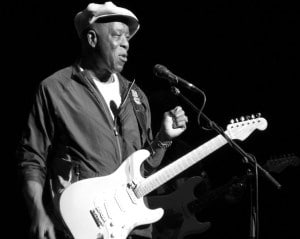He came up under the shadow of giants like Muddy Waters, but carved his own career building a bridge between the Delta roots of the blues and its re-discovery by the youth of the 60s. These records are that bridge.
Lord Have Mercy!
Young man leaves impoverished home, heads out to seek fame and fortune, becomes legend. It's the stuff of myth, and it's also the tale of many a blues musician who headed north to Chicago after World War II. This reissue of Buddy Guy's sessions for Vanguard in the late 1960s and early 1970s, however, offers a different flavour-.-the pieces are smoother and lower-key than the Buddy Guy we're used to. For instance, his version of Mercy Dee's One Room Country Shack has more of the tortured inflections of Ball And Chain than the rock'n'roll stylings that have long been a Guy hallmark.
As Buddy's tenure at Chess ended, the audience for the blues was beginning to change. The English invasion was in full swing, musicians such as the Rolling Stones, Yardbirds, John Mayall's Bluesbreakers and Jimi Hendrix redirected the blues tradition and merged it with rock, changing the musical landscape.
The first salvo in Vanguard and Buddy's joint efforts was the 1968 release of A Man And The Blues - an album despite its looser, more relaxed feel - that could have been cut at Chess Studios at 2120 S. South Michigan Avenue. Guy's deliciously understated guitar work and a tight combo, anchored by Otis Spann, lay down tough grooves on the vicious Mary Had A Little Lamb, I Can't Quit The Blues, and an exultant cover of Mercy Dee's One Room Country Shack.
The second album, This is Buddy Guy! was produced by Sam Charters and recorded before an audience of hipsters at Berkeley's New Orleans House, included here are three unreleased tracks: Herbie Hancock's Watermelon Man, Crazy 'Bout You and Slow Blues. The last album Guy recorded for Vanguard was the 1970 Hold That Plane!, the set produced by Michael Cuscuna and Buddy that featured jazz pianist Junior Mance, Philip Guy, AC Reed and Gary Bartz.
In many ways Buddy has been a living link between the country-rooted Delta blues of the early part of the last century and the electric revolution of the latter half. During his Vanguard days, as now, his music serves as a bridge between the legacy of his Delta forebears and friends - Guitar Slim, John Lee Hooker, Muddy Waters and the legion of his own disciples.







